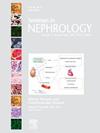Lipid and Bone Effects of Heparin Use During Hemodialysis
IF 2.8
3区 医学
Q2 UROLOGY & NEPHROLOGY
引用次数: 0
Abstract
Unfractionated heparin (UFH) and low-molecular-weight heparins (LMWHs) are commonly prescribed anticoagulants for chronic hemodialysis (HD). The dialysis population comprises a unique group that receives heparin three times per week for a long period, with potential long-term cumulative metabolic effects such as osteoporosis and worsening lipid profile. HD patients have approximately half the number of lipases as healthy individuals, and their lipid metabolism is limited because of this decrease as well as partially inhibited function. Administration of UFH or LMWHs for anticoagulation can lead to metabolic starvation despite high triglyceride levels at the end of HD. In vitro studies indicate that UFH and LMWHs inhibit osteoblasts and promote osteoclasts. In patients on HD, long-term use of UFH or LMWHs did not worsen chronic kidney disease–mineral bone disease. Further investigation is needed to elucidate the underlining mechanisms of UFH and LMWHs and their possible influences on maintenance HD patients.
血液透析期间使用肝素对血脂和骨骼的影响
非减量肝素(UFH)和低分子量肝素(LMWH)是慢性血液透析(HD)的常用抗凝剂。透析人群是一个独特的群体,他们每周三次长期服用肝素,可能会产生长期累积的代谢影响,如骨质疏松症和血脂状况恶化。血液透析患者的脂肪酶数量约为健康人的一半,由于脂肪酶数量减少以及部分功能受到抑制,他们的脂质代谢受到限制。尽管在 HD 结束时甘油三酯水平较高,但为抗凝而服用 UFH 或 LMWHs 可能会导致代谢饥饿。体外研究表明,UFH 和 LMWHs 可抑制成骨细胞,促进破骨细胞。在接受 HD 的患者中,长期使用 UFH 或 LMWHs 不会加重慢性肾病-矿物质骨病。要阐明 UFH 和 LMWHs 的基本机制及其对维持性 HD 患者可能产生的影响,还需要进一步的研究。
本文章由计算机程序翻译,如有差异,请以英文原文为准。
求助全文
约1分钟内获得全文
求助全文
来源期刊

Seminars in nephrology
医学-泌尿学与肾脏学
CiteScore
5.60
自引率
0.00%
发文量
27
审稿时长
6-12 weeks
期刊介绍:
Seminars in Nephrology is a timely source for the publication of new concepts and research findings relevant to the clinical practice of nephrology. Each issue is an organized compendium of practical information that serves as a lasting reference for nephrologists, internists and physicians in training.
 求助内容:
求助内容: 应助结果提醒方式:
应助结果提醒方式:


